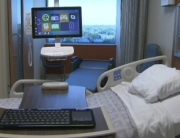Canada’s health care system has been struggling under the weight of budget reductions and the challenge of delivering services is about to get even more difficult because of demands brought on by an aging population.
That’s left hospital administrators and medical staff scratching their heads to find answers. At the same time, however, it’s also opened the door for advanced technology to step in with solutions, as author Jeffrey Simpson wrote in his award-winning book Chronic Condition, Canada’s health care system needs to be dragged into the 21st Century. Among the solutions Simpson offers are to improve service delivery and make hospitals more patient centered.
When Peter Christopoulos heard Simpson talk at a conference, it validated what he was seeing in the hospital system and convinced him that the award-winning patient bedside entertainment solution, Panacea, he has developed will be part of the health care solution.
Christopoulos is executive director of i3 Solutions, a two-time award-winner for best in class healthcare solutions. i3Solutions has developed a state-of-the-art entertainment system called Panacea which allows patients to access TV shows and movies, listen to music, cruise the Internet, play games and call family and friends, all without getting out of bed.
“It made us realize we were on the right track because what Panacea delivers in patient-centered care is exactly what Simpson was talking about,” says Christopoulos. “The system is all about providing the patient with a full suite of entertainment options and that will undoubtedly improve their hospital stay.”
Panacea was developed in Canada for the global market and has already been successfully implemented into several hospitals. A key reason behind Panacea’s success is that it operates not only as a patient entertainment system but also as a tool designed to make the system more efficient for medical staff.
While patients use it for their entertainment, nurses and doctors use it to access patient test results, such as x-rays. They can then share those results with the patient. That provides for more accurate and efficient medical care and it can all be done with the touch of a finger.
Christopoulos said the system has been designed to ensure absolute confidentiality around patient’s records. Listening to Christopoulos speak, it’s clear he is passionate about the place Panacea has in the future of health care. Panacea was developed and continues to evolve because i3 is listening to Health care providers, and transforming their needs around how to facilitate and improve patient care into real solutions.
“It’s much more than an entertainment system,” says Christopoulos. “It’s a broader movement that will take hospitals into the 21st century. It’s like a tsunami that’s going to change the way we think about patient care and is very much what the future of health care is all about.”
This blog will explore the many facts and facets of the Panacea patient entertainment system. Stay tuned for posts on what studies show on patient and practitioners satisfaction and how the Panacea solution transformed one patient’s hospital stay.







